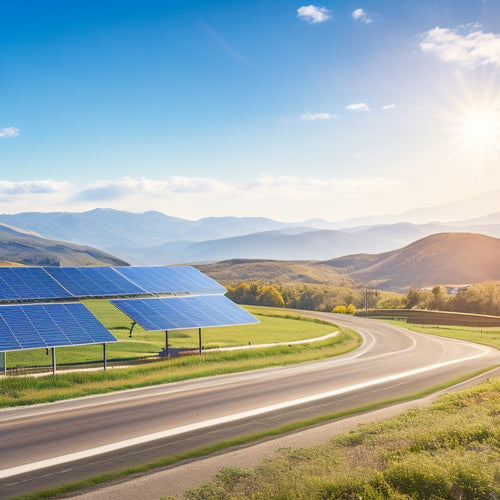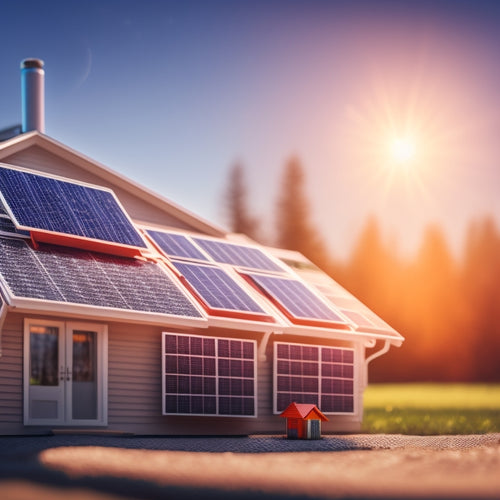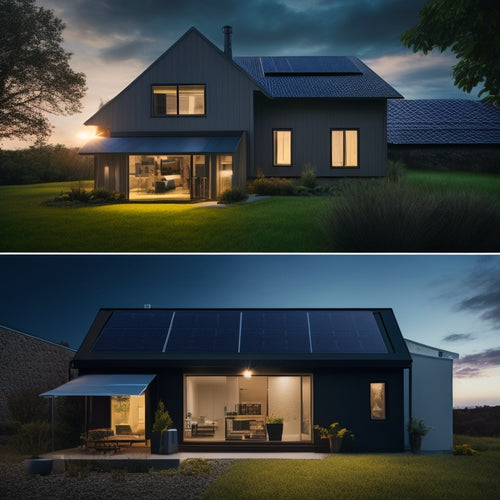
Best Home Solar Systems for My Budget
Share
To find the best home solar system for your budget, start by evaluating your energy needs and consumption patterns. Consider financing options that fit your financial situation, and take advantage of tax incentives to lower initial costs. Look for high-efficiency panels, ideally over 20%, to maximize energy production. Installing a hybrid inverter can increase flexibility and efficiency. Focus on long-term savings; reduced energy bills will recoup your investment over time. By understanding these factors, you can make an informed choice that aligns with your budget and lifestyle. There's plenty more to investigate about optimizing your solar system.
At a Glance
- Assess your energy consumption to determine the best solar system size and configuration for your specific needs and budget.
- Explore financing options like loans or leases to make the initial investment more manageable and fit your financial situation.
- Take advantage of federal and state tax incentives to significantly reduce upfront costs and enhance long-term savings.
- Consider high-efficiency panels and inverter types that maximize energy production and suit your installation space and shading conditions.
- Monitor your energy usage regularly to identify trends and adjust your solar system for optimal performance and savings over time.
Cost-Effective Energy Solution
When considering a solar system for your home, it's crucial to evaluate the initial investment against the long-term savings potential.
Properly sized solar systems can eliminate traditional energy costs, and financial incentives like tax credits can further enhance affordability.
While the upfront costs might seem intimidating, the financial benefits over time can greatly outweigh these expenses.
Initial Investment Considerations
Investing in a home solar system can seem intimidating at first, but understanding the initial costs can help you see it as a cost-effective energy solution. The upfront investment typically includes the purchase and installation of solar panels, inverters, and other necessary equipment.
However, you've got financing options that can lighten this financial load. Many solar companies offer flexible payment plans, allowing you to spread costs over time, making it more manageable.
Additionally, don't overlook tax incentives. The federal solar tax credit allows you to deduct a significant percentage of your solar installation costs from your federal taxes, which can dramatically reduce your initial investment.
Some states and local governments provide additional incentives, further sweetening the deal.
Long-Term Savings Potential
Understanding the initial investment in a home solar system sets the stage for appreciating its long-term savings potential. While the upfront costs can seem intimidating, take a moment to reflect on the financial incentives available to you, such as tax credits and rebates. These can greatly reduce your initial expenditure, making solar energy more accessible than ever.
Once installed, solar systems often require minimal maintenance costs. Unlike traditional energy sources, which can fluctuate in price and demand, solar energy allows you to utilize the sun's power for years with little ongoing expense. Most systems last 25 years or more, meaning you'll enjoy decades of savings on your electricity bills.
Additionally, as utility rates continue to rise, your solar investment becomes even more beneficial. By generating your own energy, you shield yourself from unpredictable price hikes, ultimately leading to substantial savings over time.
In essence, investing in a home solar system isn't just about going green; it's a smart financial decision that enables you to take control of your energy expenses. Welcome the freedom of energy independence while reaping long-term financial benefits.
Environmental Impact Reduction
Switching to solar energy not only cuts your energy consumption but also greatly reduces your carbon footprint.
By utilizing the power of the sun, you're making a conscious choice to lessen your environmental impact.
Additionally, solar technology plays an essential role in the renewable energy sector, contributing to sustainability efforts through community solar initiatives.
Embracing solar systems in your home is a step toward a more sustainable future for both you and the planet.
Energy Consumption Reduction
Implementing a home solar system can greatly reduce your energy consumption, leading to a considerable environmental impact reduction. By choosing the right solar panel types and conducting home energy audits, you can maximize efficiency and minimize waste. This not only saves you money but also contributes to a sustainable future.
To illustrate the benefits, consider this table:
| Aspect | Impact on Energy Consumption | Benefits |
|---|---|---|
| Solar Panel Types | Varies by efficiency | Lower utility bills |
| Home Energy Audits | Identifies inefficiencies | Optimizes energy use |
| System Size | Customized for needs | Reduces excess generation |
When you opt for solar energy, you're taking control of your energy usage. Different solar panel types, such as monocrystalline and polycrystalline, offer unique advantages. Simultaneously, a home energy audit can pinpoint areas where you can cut back on consumption.
Carbon Footprint Decrease
A home solar system greatly decreases your carbon footprint, contributing to a healthier planet. By utilizing the sun's energy, you're considerably reducing reliance on fossil fuels, which are the primary culprits of greenhouse gas emissions. This shift not only helps combat climate change but also allows you to reclaim your energy independence.
When choosing solar panel types, consider those made from sustainable materials. For instance, many manufacturers now offer panels constructed with recycled components, minimizing waste and promoting a circular economy. Every kilowatt-hour generated from your solar system means fewer carbon emissions released into the atmosphere.
Moreover, adopting solar energy aligns with a lifestyle that values freedom—freedom from rising energy costs and reliance on non-renewable resources. By installing a home solar system, you actively participate in creating a cleaner world for future generations.
The benefits go beyond just environmental impact; you're also making a sound investment in your home. As you lower your carbon footprint, you'll find peace of mind knowing you're part of the solution.
Accept the power of solar and take a step towards a sustainable future today.
Key System Specifications
When choosing a solar system, understanding efficiency ratings is essential, as they directly impact your energy production and savings.
Additionally, taking into account the type of battery for energy storage can greatly enhance your overall system performance, especially with options like high-depth-of-discharge (DOD) ratings that allow for more usable energy.
You'll also need to take into account the different types of inverters available, each offering unique benefits for your specific energy needs.
Efficiency Ratings Explained
Understanding efficiency ratings is vital for choosing the right solar system for your home. These ratings indicate how effectively a solar panel converts sunlight into usable electricity, helping you evaluate your options against your budget. Higher efficiency metrics mean more energy production from less space, which is significant if you have limited roof area.
When you perform a performance comparison among various solar systems, focus on the efficiency ratings. Panels typically range from 15% to over 22% efficiency, so knowing these figures helps you make informed decisions. A higher efficiency rating translates to greater energy output, allowing you to reduce your reliance on the grid and enjoy the freedom that comes with energy independence.
Moreover, consider how these ratings affect your overall investment. While high-efficiency panels may cost more upfront, they can yield significant savings in the long run by lowering your energy bills.
This balance between initial cost and long-term benefits is essential to maximizing your return on investment. Ultimately, by understanding efficiency ratings, you enable yourself to select a solar system that aligns with your values and financial goals, steering your path toward sustainable living.
Inverter Types Overview
Selecting the right inverter is crucial since it's the heart of your solar system, converting the direct current (DC) generated by your panels into alternating current (AC) used in your home. Understanding the different types of inverters can enable you to make the best choice for your needs.
Here's a quick comparison of inverter types:
| Inverter Type | Key Features |
|---|---|
| String Inverter | Cost-effective, easy to install, works best in uniform sunlight |
| Micro Inverter | Optimizes each panel, improves inverter efficiency, ideal for shaded areas |
| Power Optimizer | Works with string inverters, enhances efficiency, allows for panel-level monitoring |
| Hybrid Inverter | Combines solar and battery storage, offers flexibility, improves inverter reliability |
| Inverter Placement | Location impacts performance, consider ventilation and accessibility |
When choosing, think about inverter compatibility with your solar panels and the overall layout of your system. Remember, a well-placed inverter can greatly improve inverter efficiency and reliability, giving you the freedom to utilize solar energy effectively. Make your choice wisely to secure long-term benefits and energy independence!
Selecting Based on Energy Needs
To choose the right solar system, you need to assess your energy consumption accurately. Conducting energy audits can provide a thorough examination of your energy usage, helping identify energy-intensive appliances and their specific consumption rates.
Understanding how much energy you use helps you evaluate the system's efficiency and guarantee it meets your needs. By aligning your energy habits with the right solar solution, you can maximize savings and sustainability.
Additionally, creating energy mapping can visualize your usage patterns and identify potential efficiency improvements energy audits.
Assessing Energy Consumption
As you assess your home's energy consumption, it's crucial to identify exactly how much electricity you use on a daily and monthly basis. Start by performing an energy audit, which reveals your home's usage patterns and identifies areas where you can save. This process aids you in understanding not just your total energy consumption, but also which appliances and activities are major contributors to your bills.
To get a clearer view, track your energy usage over a few months. Look for trends—do you use more electricity during certain seasons or times of day? This understanding can guide your decision-making when selecting a solar system. By aligning your solar setup with your actual energy needs, you'll guarantee that you utilize enough power to cover your consumption, maximizing both efficiency and savings.
Moreover, understanding your usage patterns allows you to choose a solar system that not only fits your budget but also enables you to take control of your energy independence.
With the right information, you can choose a system that meets your needs, reduces your reliance on the grid, and ultimately paves the way for a more sustainable lifestyle.
Evaluating System Efficiency
Evaluating system efficiency is vital for optimizing your solar investment and guaranteeing it meets your energy needs.
When selecting a solar system, focus on system performance metrics, such as energy output and efficiency ratings. These metrics directly impact your energy independence, allowing you to utilize the sun's power effectively.
Consider your specific energy requirements and how they align with the system's output. A high-efficiency solar panel might cost more initially, but its superior performance can lead to greater savings over time.
You'll want to weigh these benefits against your budget.
Installation factors also play an important role in system efficiency. The orientation and angle of your solar panels can greatly affect their energy production.
Confirm that the installation is optimized for maximum sunlight exposure, considering any potential shading from trees or buildings.
Higher Long-Term Savings Potential
When you invest in a home solar system, you'll likely notice a significant reduction in your energy bills over time.
This savings can add up, allowing you to recoup your initial investment while also enjoying lower monthly expenses.
Reduced Energy Bills
One of the most persuasive reasons to invest in a home solar system is the significant reduction in energy bills, leading to higher long-term savings potential. By utilizing solar energy, you can drastically cut your monthly expenses, giving you more freedom to allocate your budget elsewhere. Plus, with solar incentives and utility rebates available, your initial investment can be reduced, further enhancing your savings.
Here's a snapshot of potential savings over five years with a solar system:
| Year | Energy Bill Savings | Incentives & Rebates | Total Savings |
|---|---|---|---|
| 1 | $1,000 | $2,500 | $3,500 |
| 2 | $1,050 | $0 | $4,550 |
| 3 | $1,100 | $0 | $5,650 |
| 4 | $1,150 | $0 | $6,800 |
| 5 | $1,200 | $0 | $8,000 |
As you can see, the cumulative savings can be substantial. Investing in solar not only reduces your energy bills but positions you for greater financial freedom in the long run.
Frequently Asked Questions
What Are the Available Financing Options for Home Solar Systems?
You've got several financing options for home solar systems. Consider solar loan options for ownership benefits or leasing agreements for lower upfront costs. Both paths can enable you to utilize solar energy and reduce utility bills effectively.
How Do I Choose a Reputable Solar Installer?
To choose a reputable solar installer, check their certifications and read customer reviews. A qualified installer guarantees quality work, while positive feedback from customers confirms reliability and satisfaction, giving you the freedom to enjoy your solar investment.
Are There Any Government Incentives or Rebates for Solar Installation?
Imagine your home as a sunlit garden; federal tax credits and state incentives can help it flourish. By exploring these opportunities, you can cultivate savings and enjoy the freedom of sustainable living without breaking the bank.
What Maintenance Do Solar Systems Require Over Time?
Solar systems require regular maintenance to guarantee peak system efficiency. You'll need to schedule panel cleaning to remove dirt and debris, allowing sunlight to reach the panels effectively, maximizing energy production and your energy independence.
How Does Solar Energy Affect Property Value?
Solar energy can greatly enhance your property's value. With rising solar market trends and energy efficiency benefits, potential buyers often seek homes with solar systems, seeing them as investments in sustainability and reduced energy costs.
Explore More
In the quest for solar energy, you can practically feel the sun showering you with savings! By choosing the right home solar system, you're not just slashing your electricity bills; you're joining a revolution that's saving the planet one rooftop at a time. Imagine capturing sunlight like a superhero, all while enhancing your home's value! So, don't just sit there—take the leap into a brighter, greener future that pays you back like a treasure chest overflowing with gold!
Related Posts
-

Is Switching to Green Energy Solutions Easy
Switching to green energy solutions isn't just easy; it's also beneficial. You can greatly cut utility costs and enjo...
-

A Beginner's Guide to Navigating the Solar Investment Tax Credit
You're eligible to claim a significant Solar Investment Tax Credit (ITC) of 30% of total installation costs, but mane...
-

Cost of Home Solar Battery
You're looking to invest in a home solar battery to reduce your grid reliance, but you're curious about the cost. The...


